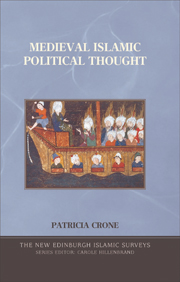Book contents
- Frontmatter
- Contents
- List of charts
- Preface
- Addenda and corrigenda
- I THE BEGINNINGS
- II THE WANING OF THE TRIBAL TRADITION, c. 700–900
- III COPING WITH A FRAGMENTED WORLD
- 12 INTRODUCTION
- 13 THE PERSIAN TRADITION AND ADVICE LITERATURE
- 14 THE GREEK TRADITION AND ‘POLITICAL SCIENCE’
- 15 THE ISMAILIS
- 16 THE SUNNIS
- IV GOVERNMENT AND SOCIETY
- Charts
- Bibliography, abbreviations, and conventions
- Index and glossary
16 - THE SUNNIS
from III - COPING WITH A FRAGMENTED WORLD
Published online by Cambridge University Press: 05 August 2013
- Frontmatter
- Contents
- List of charts
- Preface
- Addenda and corrigenda
- I THE BEGINNINGS
- II THE WANING OF THE TRIBAL TRADITION, c. 700–900
- III COPING WITH A FRAGMENTED WORLD
- 12 INTRODUCTION
- 13 THE PERSIAN TRADITION AND ADVICE LITERATURE
- 14 THE GREEK TRADITION AND ‘POLITICAL SCIENCE’
- 15 THE ISMAILIS
- 16 THE SUNNIS
- IV GOVERNMENT AND SOCIETY
- Charts
- Bibliography, abbreviations, and conventions
- Index and glossary
Summary
The Sunnis have their roots in, and derive their name from, the partisans of ḥadīth who came to prominence in the ninth century under the name of ahl alsunna wa'l-jamāa. It is probably safe to say that by the end of the ninth or the beginning of the tenth century the majority of Muslims had come to accept their political convictions. Numerous though the Shīites were in those centuries, most Muslims were neither Shiites nor Khārijites; and most of those identifiable in negative terms could now also be identified in positive terms as accepting the four-caliphs thesis and holding communal togetherness to be more important than rightly guided leadership. But the adherents of communal togetherness (jamāa) were still divided over theology and law. They disagreed not only over concrete doctrines, but also over the rules by which doctrines were to be derived and explained. The partisans of ḥadīth concentrated all authority in God and His prophet: what came from them was authoritative information of super-human origin (sam) which had to be taken on trust, just as it stood (bilā kayf), whether or not it made sense in terms of such rationality as humans possess. The jurists (fuqahā˒) and theologians (mutakallims), both of whom had begun their system-building before the traditionalists appeared on the scene, maintained that one could not answer questions about either the law or the articles of faith without employing human reasoning (which the jurists initially called ra˒y, sensible opinion, thereafter qiyās, analogy, while the theologians spoke of naẓar).
- Type
- Chapter
- Information
- Medieval Islamic Political Thought , pp. 219 - 256Publisher: Edinburgh University PressPrint publication year: 2004



